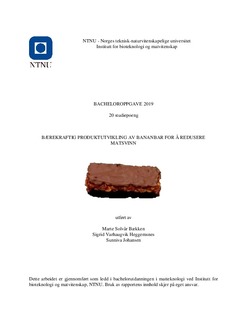BÆREKRAFTIG PRODUKTUTVIKLING AV BANANBAR FOR Å REDUSERE MATSVINN
Bachelor thesis
Permanent lenke
http://hdl.handle.net/11250/2613555Utgivelsesdato
2019Metadata
Vis full innførselSamlinger
Sammendrag
For å bidra til å redusere matsvinn er det gjennomført et forsøk på en bærekraftig produktutvikling ved å bruke overmodne bananer i småskalaproduksjon av bananbarer. Det ble først innsamlet nok litteratur til å kunne starte en prototypeutvikling av bananbar. Underveis ble egenskapene riktig konsistens og god smak vurdert, i tillegg ble ernæring vurdert opp mot en referansefrokost. Det ble utviklet tre prototyper bar A (basisresept), bar B (appelsin og chili) og bar C (appelsin).
For å finne ut om produktet kan lykkes på markedet ble det gjennomført en aksept-test med 54 dommere. Bananbarene ble bedømt ved bruk av en 9-punkts hedonisk skala. Gjennomsnittlig grad av liking for alle bananbarene var mellom 5 og 6 og det ble ikke funnet en signifikant forskjell i grad av preferanse mellom bananbarene.
Det ble videre utført mikrobiologiske analyser av bar B for å kunne si noe om holdbarheten og produksjonshygienen ved produksjon. Det ble også gjennomført en analyse for mugg og gjør. Resultatene ble varierende og det er ikke nok grunnlag for å si noe om holdbarheten i bananbaren. Oppgaven resulterte i en bærekraftig småskala produktutvikling av bananbarer. Det finnes ingen holdepunkter for å si om produktet klarer seg på markedet eller ikke, og det er ikke mulig å si noe om holdbarhetstiden ut ifra resultatene. Småskalaproduksjon vil i seg selv ha liten effekt på reduksjon av matsvinn og for å ha en større påvirkning bør produktet oppskaleres til storskalaproduksjon. To help reduce food wastage it has been conducted a scientific experiment regarding sustainable product development by using overripe bananas in small-scale production of banana bars. To begin the prototype development of a banana bar It had to be acquired enough literature. During the experiment, characteristics like the right texture and taste were considered. The banana bar’s nutrition was measured by comparing nutritional content to a reference breakfast. Three prototypes were developed during the experiment; “bar A” (developed through a basic recipe), “bar B” (developed with the main taste orange and chili) and “bar C” (main taste orange).
An accept-test with 54 test participants was conducted to find out whether the product would be successful from a marketing perspective. The banana bars were evaluated using a nine-point hedonic scale and the average degree of preference for all banana bars (A, B and C) was between five and six on the scale. It was not found a significant difference in preference between the three bars.Continuing the experiment, it was conducted microbiological analyses of bar B to be able to test expiry and hygiene during production. The results were not consistent and there was not enough basis to draw an unambiguous conclusion about the banana bar’s expiry.
The scientific experiment resulted in a sustainable small-scale production of banana bars. There are no certain reference points as to say if the products can be utilized from a marketing perspective and the product’s expiry cannot be determined based on on the results of the experiment. The efficiency of small-scale production of banana bars is vastly insufficient to have an impact on food wastage.
